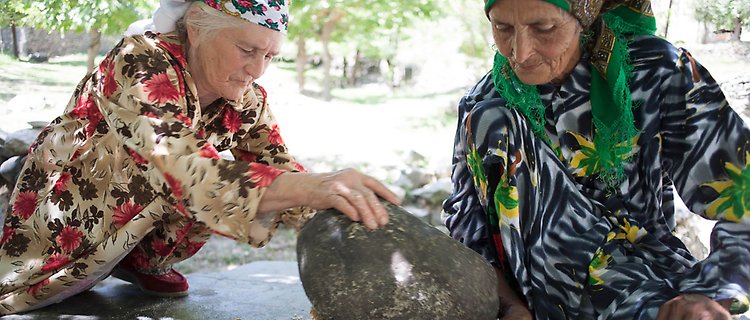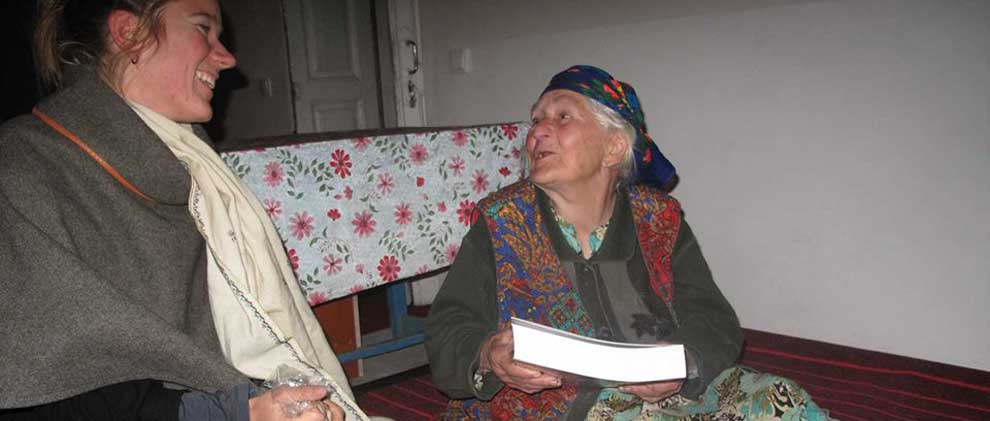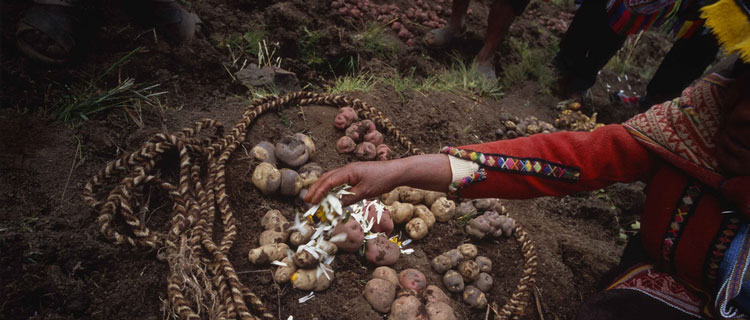
A cookbook written by centre PhD student Jamila Haider and Frederik van Oudenhoven (pictured) took the top prize at the prestigious international Gourmand cookbook awards in May 2016. van Oudenhoven accepted the award which took place in Yantai, China.
Bildtext får vara max två rader text. Hela texten ska högerjusteras om den bara ska innehålla fotobyline! Photo: B. Christensen/Azote
BOOK AWARDS
Winner of the Gourmand world cookbook award 2016
Cookbook written by centre researcher Jamila Haider and Dutch researcher Frederik van Oudenhoven wins international cookbook of the year award
- "With Our Own Hands" contains over 100 recipes from the Pamir mountains straddling Afghanistan and Tajikistan, and has been described by the panel of judges as “revolutionary”
- It is the first book written about the Pamiri culture in languages accessible to the people living there
- Gourmand cookbook awards is the most prestigious and largest award in the culinary calendar.
"With Our Own Hands" has been awarded “cookbook of the year” by the Gourmand World Cookbook Awards' panel of judges, announced at the awards ceremony in Yantai, China on Sunday 29 May.
The book, which contains over 100 recipes from the Pamir mountains straddling Afghanistan and Tajikistan, challenges what a cookbook can be and has been described by the panel of judges as “revolutionary”. The richly-illustrated book combines the region’s ancient ecological, agricultural and cultural heritage - it is thought that rye originated in the Pamir mountains, and is home to a rich diversity of various varieties of walnuts, apples, pears, apricots, mulberries, and over 150 varieties of wheat.
Each recipe holds a historical record of the cultures, rituals and traditions of the Pamiri people, their landscape, farming techniques and their ancient knowledge of biodiversity and ecology. This knowledge is rapidly disappearing as young generations leave the area.
“The authors of this work have done us a great service in showing us what is at stake: the loss of thousands of years of learning and wisdom, as well as a unique environment which, once lost, cannot be regained.”
"With Our Own Hands" book foreword by Charles, the Prince of Wales
Co-author of the book Jamila Haider, and PhD candidate at the Stockholm Resilience Centre, says “We are surprised and honoured to win this award. The book was never meant for the outside world. We wrote it for the Pamiri people. We returned last October to distribute 1700 copies of the book to the villages – to the holders of this knowledge and craft. They trusted us with their knowledge.”
Watch video of Jamila Haider presenting the book to the women and farmers who had shared their knowledge and stories:
First book written in local language
The book is written in three languages – English plus Dari (in Arabic script) and Tajik (in Cyrillic), the forms of Persian spoken in Afghanistan and Tajikistan respectively. It is the first book written about the Pamiri culture in languages accessible to the people living there.
The region has a high diversity of completely unique and endangered languages due to the deep inaccessible valleys and high altitudes that cut villages off from one another. It harbors a remarkable biological diversity for similar reasons – the many plateaus and steep-sided gorges create unique microclimates.
Species evolve – often by the hands of farmers – to cope with these differing conditions creating many varieties. Red spring wheat, for example, only grows in the high reaches of the Bartang valley, and is grown especially to celebrate Nawruz, the Persian new year, to make a dish called Baht.
“A tradition that has been carried on for centuries is responsible for preserving a variety of wheat. We can see that culture and biodiversity are intimately linked. When people leave, we lose more than just culture and a way of life, we lose biodiversity and the knowledge about how to use it,” says Haider.
“Saving the seeds in a seed bank is not enough; when the relationship between people and the earth is severed, I worry that the very source of innovation is lost with it,” adds Haider.
Starting with a grandmother's recipies
The book’s origin stems from a chance encounter in 2009 over a bowl of Pamiri apricot soup with co-author Frederik van Oudenhoven, a Dutch ethnobotanist who had started collecting recipes from the region with a small dedicated group of Pamiri scientists (all women!).
The next day, in the village of Mun in the Ghund valley, an elderly grandmother told them stories about the food she once used to eat.
“Very soon, her entire family was there, listening to her, and more and more people joined. She asked us to write down her recipes. That way, she said, she could leave them for her children and grandchildren. The real need for the book became very clear,” says van Oudenhoven who carried out the work alongside his research for the Rome-based International Plant Genetic Resources Institute (Bioversity International).
Haider takes up the story, “A year later, I gave up my job working for a development organization in Afghanistan. I felt some of the projects being implemented did more harm than good – bringing in foreign patented seed varieties and losing the native seeds, and language and culture attached to them. So I contacted Frederik, who was studying agroecology in the Andes, and asked him whether he wanted to write this book. We barely knew each other, having only met once before - but we both felt this needed to happen.”
Much more than a book
After four years of work, the book was published, and the authors returned to Tajikistan and Afghanistan with a book for every community.
“At first people were just surprised that we had come back with the book. It’s not so often that written knowledge returns to its source. This was followed by shrieks of glee or disbelief when people realized what the book was. As one elderly man told us: ‘you have captured the knowledge that has only existed in our hands,’” says van Oudenhoven.
The book is attracting the interest of chefs looking for new ideas, including a group of Sweden’s leading chefs.
“The chefs were certainly intrigued particularly by the Pamiris’ use of apricot pits in cooking. In the Pamirs, you use all parts of the food – nothing should be wasted. So when you eat an apricot, you keep the pit, break it open to extract the seed which can be eaten fresh, dried, or pressed into an oil. The dry excess can be used to flavor and thicken soups as roux, with diverse and extraordinary medicinal properties,” says Haider.
“And Osh for example, which is a noodle soup of six or more grains and pulses grown, harvested, milled and rolled into a noodle all-together. Growing the seeds together means the soil remains healthy, harvesting and milling it all together is quick and easy! And the taste … each mouthful is a diversity of earthy pulses and fresh pea held together with wheat or rye.”
While the project started as a recipe book, it quickly became much more.
“As people started to talk about making noodle soup, the conversation went deeper to explain how they created the soil in which the seeds grow, and how they sow for example many different legumes and grains together, which they then cultivate all at once to make the soup. But as the full recipe unfolded, stories, poetry and folk songs emerged.”
Efforts to increase the efficiency of the global food system has led to massive homogenization of food crops. With climate change, the crops selected to maximise production are increasingly vulnerable to crop failure due to extreme weather events. The diversity of stable crop varieties in the Pamirs make it an important repository for global food resilience. Many seeds in the Pamirs have been collected and saved in the Svalbard seed vault, but the knowledge and practice that created and maintains those seeds is not frozen along with those seeds. This book documents this knowledge.

Photo: J. Quax (www.judithquax.com/)
Owen Gaffney
Media, Stockholm Resilience Centre
Tel: +46 (0) 734604833
Owen.gaffney@su.se
Jamila Haider
Tel:+46 701917903
jamila.haider@su.se
Fredrik van Oudenhoven
fvanoudenhoven@gmail.com
Edouard Cointreau
President, Gourmand International
edouard@gourmandbooks.com
Tel: + 86 152 6535 5379
Read more about the book "With Our Own Hands" here
About the Gourmand awards
The objectives of the awards are:
- To reward and honour those who "cook with words"
- To help readers find the best out of the 26,000 food and wine books produced every year.
- To help publishers with international rights to translate and distribute food and wine books.
- To help book retailers find the 50 food and wine books that each year should be offered to clients.
- To create an opportunity to access the major markets in English, Chinese, German, Spanish or French for books originated in other languages.
- To increase knowledge and respect for food and wine culture, which promotes peace.








